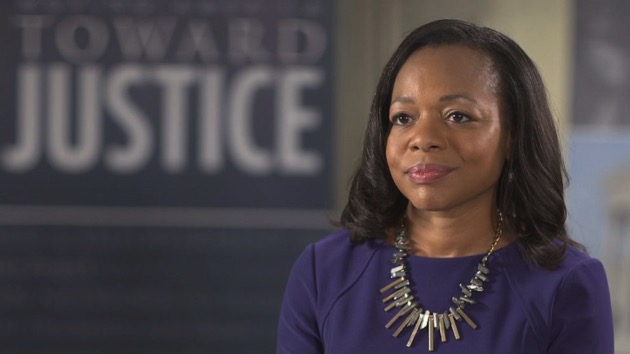
Kristen Clarke, president and executive director of the Lawyers Committee for Civil Rights Under Law, oversees the group’s nonpartisan Election Protection voter help hotline. – (ABC News)By DEVIN DWYER, ABC News
(WASHINGTON) — A tidal wave of changes to U.S. election procedures caused by the coronavirus pandemic has triggered a cry for help from tens of thousands of American voters.
Nonpartisan voter advocates with the Lawyers’ Committee for Civil Rights Under Law report a record surge of phone calls to the group’s “Election Protection Hotline” from people concerned about their registration status, absentee ballot deadlines and delivery delays by the U.S. Postal Service.
“We’ve gotten calls in the tens of thousands,” said Kristen Clarke, the committee’s executive director and one of the nation’s leading nonpartisan election lawyers. “We definitely are getting more calls from people who’re trying to figure out how to vote absentee for the first time.”
ABC News got an inside look at hotline operations and the more than 12,000 volunteer lawyers from across the country who are fielding calls virtually, from home. The corps of volunteers is more than double the number of lawyers who participated in 2016.
“When you call the hotline, we’re not selling you anything. We are very focused on: Why are you calling? Are you registered?” said attorney Nadine Mompremier of Brooklyn, New York, who spends several hours nightly taking calls from voters.
Georgia, Texas and North Carolina top the list of states with the most callers, according to the Committee’s hotline data.
“We tend to get a lot of calls from Black voters, from Latinos and Native American voters who face disproportionate rates of voter suppression and voter discrimination,” said Clarke.
Volunteer John Bennett of New Canaan, Connecticut, who has been helping voters through the hotline for 12 years, said making sure a registration is up to date and active is the most important step to take in late September.
“Oftentimes folks think about it a little bit too late in the game,” Bennett told ABC News Live.
Under federal law all states are required to clear from registration lists voters who have died, moved or otherwise become ineligible. At least 17 million people have been removed from state rolls between 2016 and 2018 alone, according to the Brennan Center for Justice which tracks the data.
Six states have so-called “use-it-or-lose-it” laws that cancel registrations of inactive voters, according to the group.
Mompremier told ABC News that the most common voter concern she hears is from voters who show up to vote early in-person or on Election Day and their names are not on the list.
“Let’s say you voted in 10 elections, and you decided not to vote in 2016, and you tried to vote in 2018, or you’re trying to vote in 2020 but your state or local board of elections have removed you from the polls because you missed one election,” she said.
Raising the stakes for volunteers is a surge of misinformation about mail-in voting as now 45 states plus Washington, D.C., allow anyone to send in a ballot as a result of COVID-19.
“There’s definitely been folks calling in and expressing some level of concern with the Postal Service given everything that’s in the news,” said Bennett. “Our advice is just if you do want to vote by mail, request your ballot as soon as you can.”
President Donald Trump has recently contributed to voter confusion by suggesting that voters who mail their ballots this year should show up in person on Election Day to vote again if their ballot isn’t already in the system.
The Lawyers’ Committee says it remains illegal in every state to cast a ballot twice.
There is also a swirl of unfounded claims about fraud, though voting by mail has been a regular part of American elections since the Civil War without any evidence of widespread malfeasance.
“If (your ballot) is mailed by a certain date and postmarked, it will count and that is your vote,” said Mompremier. “But it’s a matter of also making sure that you sign, because a lot of reasons why the mail-in ballots may be rejected are signatures and (forgetting) to sign it at the bottom.”
Clarke says she’s confident a historic surge in mail ballots this year can produce a fair election outcome, but she and other nonpartisan election watchdogs worry that some voters might miss out this year on an opportunity to cast a vote.
“Make a plan now,” Clarke said. “This year, we’re encouraging people to not so much think about Nov. 3rd as Election Day, but really to think about October as election season.”
The Election Protection Hotline at the Lawyers’ Committee for Civil Rights Under Law can be reached at 1-866-OUR-VOTE.
ABC News’ Jackie Yoo contributed to this report.
Copyright © 2020, ABC Audio. All rights reserved.
